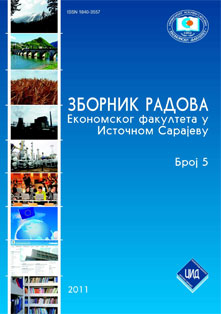KRIZA I EKONOMSKE PARADIGME
CRISIS AND ECONOMIC PARADIGM
Author(s): Novo PlakalovićSubject(s): Economy
Published by: Ekonomski fakultet Pale - Univerzitet u Istočnom Sarajevu
Keywords: financial and economic crisis; the crisis in Bosnia; the economic paradigm; the IMF program.
Summary/Abstract: The paper deals with the current financial and economic crisis. The crisis spilled over from developed countries on the periphery and on Bosnia and Herzegovina economy. Given the extent of financial and economic crisis, the question is whether the ruling economic paradigm led to a crisis and whether it is necessary to review it. States’ response to the crisis is expected. Governments have invested huge financial resources in order to save important financial institutions. Regulation of financial institutions is significantly changed and adopted a new set of rules-Basel III. The aim is to triple capital requirements until 2019 and to strengthen monitoring of bank liquidity. Crucial assistance in mitigating the effects of the crisis to developing countries and transition economies was provided by IMF with considerably increased financial potential. In its programs of assistance IMF has retained its economic doctrine. Countries are allowed some flexibility and discretion in the selection of certain instruments of economic policies and IMF has not insisted so much on structural reforms so far. The academics reinforced the neo-liberal critique of the concept but do not offer new models. Emphasis is placed on the irrational behavior of economic actors as opposed to initial assumptions of neoclassical theory that all economic participants are rational. The occurrence of the crisis denied such a setting. It is necessary to further review the ruling economic paradigm.
Journal: Zbornik radova Ekonomskog fakulteta u Istočnom Sarajevu
- Issue Year: 2011
- Issue No: 5
- Page Range: 75-94
- Page Count: 20
- Language: Bosnian

